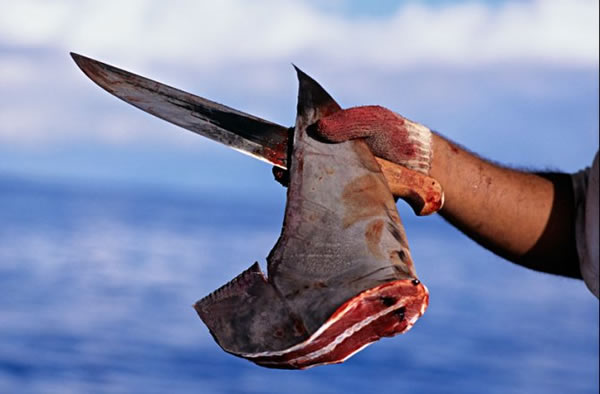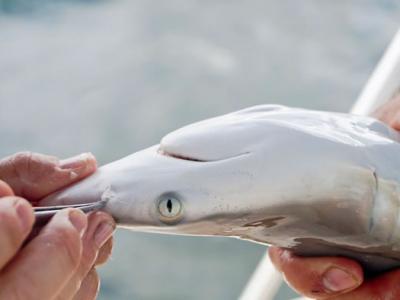State vs Fed Clashing on Shark Protections
Freshly cut dorsal fin of Scalloped Hammerhead Shark (Sphyrna lewini).
A dozen shark attack survivors who work to save the ocean’s top predator are speaking up again to prevent the U.S. government from taking a big step backward in shark conservation.
The Ocean is in Danger!
Anthony looks at the dire state of perhaps the most interesting and diverse part of our planet.
DCI
The survivors, including myself, hail from across the country, and some have lost an arm or leg. We want the government to stay true to the Shark Conservation Act, a law that we worked to get on the books in 2011. The act strengthens provisions requiring that sharks caught and brought into U.S. ports are intact.
The federal law was intended to eliminate the practice of shark finning—slicing off the lucrative fins at sea and then dumping the bodies overboard where the sharks end up drowning or bleeding to death. Fishermen can fetch up to $300 per pound for shark fins, which are used as a soup ingredient and sold mostly in Asian markets. The law helps ensure that finning cannot take place on any ship in U.S. waters.
In the last few years, 10 U.S. states and territories have gone further and passed even tougher legislation aimed at protecting dwindling shark populations. Since 2010, Hawaii, California, Washington, Oregon, Illinois, Delaware, Maryland, Guam, the Northern Mariana Islands and American Samoa have all banned the trade of shark fins. American Samoa, Guam and the Northern Mariana Islands have even outlawed the catch and possession of sharks in their territorial waters. The bans were adopted after considerable public feedback and reflect the unique concerns, needs and desires of citizens in those regions.
Here’s the problem facing us now: Federal regulators crafting rules to put the Shark Conservation Act into effect say that those state and territorial laws may conflict with federal law because they interfere with fishing in U.S. waters. As a result, the National Oceanic and Atmospheric Administration has proposed guidelines that could overturn the decisions made by the citizens of those states and territories who recognize the peril facing the world’s sharks and have offered them needed protection.
The shark attack survivors, who work with The Pew Charitable Trusts, are now writing to NOAA in hopes the agency will recognize that these individual laws can complement—not conflict with—the Shark Conservation Act. We have found a way to overcome our injuries to work for a greater need: helping protect a predator that is crucial for a healthy ocean ecosystem. Similarly, we want our federal government to find a way to work through legal challenges and continue to make the U.S. a global leader in shark conservation.
If you want to tell NOAA to stay true to the intent of the Shark Conservation Act, please sign Pew’s petition here.
You can find out more about the shark attack survivors and our continuing work through this link at PEW.(Jun 27, 2013 10:00 AM ET // by Debbie Salamone, The Pew Charitable Trusts)












